Jude Knight's Blog, page 43
July 5, 2022
The plot thickens on WIP Wednesday
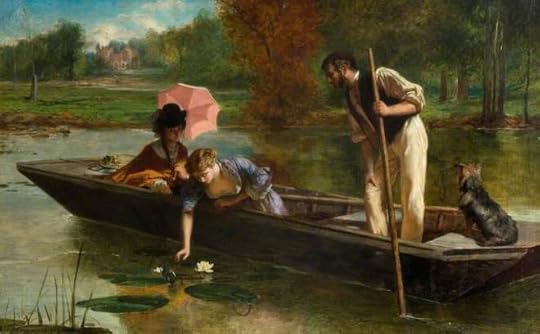
In this week’s WIP extract, I tangle several different plot threads just a little more.
Margaret sat with her friends in the shade, sipping fruit juice and watching Peter, Ash, Deerhaven and Snowy on the lake with half a dozen other men, rowing two to a boat in heat after heat. The ladies had been out on the water, but when the men challenged one another to a race, they had asked to be set ashore on the island, where refreshments were set out in the temple-like folly.
“You like him, don’t you?” Regina asked Margaret.
“Which him?” Margaret asked, though she knew perfectly well that Regina was referring to Snowy.
“I do,” Arial said. “Peter does, too. He is not what we expected when you told us about allowing him to escort you, Margaret.”
Margaret dropped the pretence to pursue this more interesting topic.
“What did you think he would be like?”
Arial thought about it. “A lot rougher. Less concerned about your safety and your reputation.”
“After all,” Cordelia pointed out, “you did meet him in a slum alley just behind the brothel where he works. It was not a recommendation.”
Regina agreed. “We were concerned, but not now that we have met him.”
“He has been raised as a gentleman,” Margaret said. “In my experience, he is more of a gentleman than many you meet in Society.”
The other ladies nodded. “Lord Snowden for one,” Regina agreed. Snowden was watching them from the far shore. His son and young Deffew, his ward, were out on the lake, racing, but Snowden did not turn his stare away from the four ladies.
“The rumours say he is not the viscount, that there is a lost heir. Is it Snowy, do you think? Is that what this display of Snowy’s is about?” Ariel asked.
“He hasn’t said,” Margaret told them. “But the way these rumours have appeared just when he chooses to go into Society—it is too unlikely a coincidence. I think he must be behind them. Lord Snowden must be rattled. He sent his son to tell me that Snowy was a charlatan, a fraud, and that I must cease seeing him immediately.”
Regina’s reaction was the same as Margaret’s. “The cheek!”
“Interesting, though,” Cordelia mused. “Have you told Snowy?”
A face on the other shore had caught Margaret’s eye. It could not be… At this distance, it was impossible to be sure, but somehow, she was.
“Margaret?” Arial asked.
“Hmmm?” What had they been talking about? “No, I haven’t had the opportunity, yet.”
Her friends were looking at her with concern. “You have gone pale, darling.” Arial said. “Is something the matter?”
“Nothing,” she assured them. “I thought I saw someone I knew long ago. But I am sure I was wrong. He was some distance away, and I could not see the face clearly. Just the hair colour and the uniform.”
“Not the odious officer!” Arial exclaimed.
“The odious officer?” asked Cordelia.
Arial was the only one who knew quite how odious Martin had been, but the rest was not a secret. “A man who trifled with my heart during my first Season. I was too young to realise what his compliments were lies and his promises so much empty air. I am sure it cannot be him. As far as I know, his regiment is still posted overseas.” For years she had been checking the listings in the newspapers, hoping that he never sold out.
July 3, 2022
Tea with Ulrick

Sir Ulrick de Mohan made his way from the training field and took the steps two at a time to reach the door leading into the keep of Berwyck Castle. The day had been fulfilling and he was eager to change out of his chainmail and enjoy a good cup of ale after a hard day’s work. The door opened before him and as he went through the portal, he skidded to a halt. He pulled his sword from his scabbard and held it before him. This was not Berwyck!
A man in uniform held out his arm as if Ulrick had been expected. “This way, sir.”
Ulrick took in his surroundings from the costly items in the foyer to the images of paintings hanging on walls that were surely not of his time. God’s Blood! Had he somehow found himself in the future where some of the women who came to Berwyck were from?
He had no answers other than his confusion when he was taken down the corridor into the interior of the castle. Mayhap the woman to whom he was taken would know. She sat in a room of such magnificence he pondered if mayhap he was sitting before a future Queen of England.
“Oh dear,” the woman murmured, once she saw him standing in her doorway. “I haven’t had one of your kind in quite a while. Come in, dear boy, and stop your gawking.”
He scoffed at the dear boy remark, came to stand before her, and bowed. “My lady.”
 Her brow rose as she looked him over. “And you are?” she asked lifting a dainty cup to her lips.
Her brow rose as she looked him over. “And you are?” she asked lifting a dainty cup to her lips.
He straightened. “Sir Ulrick de Mohan.”
“Welcome to my home, Sir Ulrick. I am the Duchess of Haverford,” she replied. “Tea?”
A sound escaped him. What was this tea? “Where am I?’ he asked instead, whilst his gaze continued to look around the room in disbelief.
“Maybe something stronger would be fitting to calm your nerves,” she replied, waving to what he assumed was another servant standing near the door. A clear glass with an amber liquid was pressed into his hands and he sniffed the contents.
The Duchess said, “I understand time traveling can take a bit out of you.”
He was about to take a sip, when her words penetrated his head. “Is that what I have done? Traveled through time like one of those future women who find themselves at Berwyck’s gates?”
“Well, you’re obviously still not in… the twelfth century was it? Are you?”
He pondered her words, took a sip of the contents of his cup, and then unstuck the words from his throat in order to answer her. “Aye. I suppose I am not. Whatever am I doing here with you then?”
The duchess sat back in her chair. “What is it you need in your life, good sir, to make you content?”
“Need? I have everything I want in life. There is nothing I need,” he said, setting the cup down after downing its contents.
“It has been my experience that, when a knight happens to cross time and come before me, it is generally because he is missing something in his life. Usually that something is a woman… or a wife. In either case, a lady may just fall into your life whether you are ready for her or not,” she answered, and Ulrick could swear he saw her eyes twinkling mischievously. “The question remains… what will you do with her once she is in your arms?”
“Not one of those future women!” he fumed picking up his glass and then remembering he had already drunk the contents. The duchess saw his dilemma and nodded to the servant, who refilled the glass.
“Who is to say? You are the master of your own happily-ever-after. I am but a slight diversion in your life to give you something to think about when you return to your own time.”
“And will I return? To my own time, that is?” She nodded instead of answering him. Ulrick once more downed his drink and began to feel the pull of the twelfth century calling to him to return.
“Remember my words, Sir Ulrick. What is it you really need in your life to make you happy and complete? You may not be looking for a wife, but do not easily dismiss the gift you will be given.”
One moment he was sitting with the duchess in a world not his own and the next he was back entering the keep at Berwyck Castle. He could only ponder if what had just happened to him really occurred or if he had imagined the whole damn thing!

Promises Made At Midnight: The Knights of Berwyck, A Quest Through Time (Book Six)
By Sherry Ewing
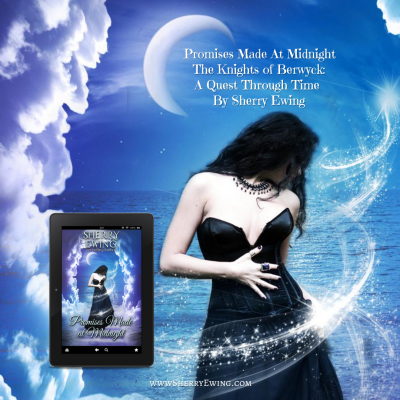 Sometimes all it takes to find your heart’s desire is to make a wish…
Sometimes all it takes to find your heart’s desire is to make a wish…
After a series of failed relationships, Bridgette Harris would like a fresh start. If only she could escape her ex-boyfriend since they participate in the same renaissance fairs. While gazing at a granite statue of a handsome knight—her dream man—at one such fair, a mysterious elderly Scottish woman offers her a coin to toss into the fountain and make a wish. Bridgette can’t resist, but nothing prepares her to suddenly slip through time.
Sir Ulrick de Mohan does not have time for love. He is charged with training possible recruits to become worthy guardsmen for the Devil’s Dragon. The woman who magically appears out of thin air and falls into his arms must be one of those future ladies who continue to show up at Berwyck’s gate. But she can’t be for him.
Fate has brought two people together despite the centuries that should be keeping them apart. Will the growing love between them be enough to keep Bridgette in the past or will Time return her to where she should belong?
Buy Links:Amazon US: https://amzn.to/36NpNrv
Apple Books: https://apple.co/3C1muIK
Kobo: https://bit.ly/3voNJvw
Nook: https://bit.ly/3M34Hpb
Books2Read: https://books2read.com/u/4Ap6xd
June 28, 2022
A girl’s first ball on WIP Wednesday
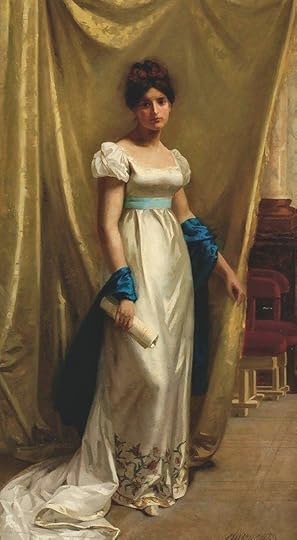
The book I have just finished has two distinct parts and a bridging section. In the first part, my heroine is turning 17, and one of the scenes is set at her birthday ball, which is also her debut to Society. The section follow her from the planning for the ball to the end of her first Season. The second part picks up the story sixteen years ago, when she is a widow and the boy she wanted to dance with at her ball returns from many years overseas. Today’s piece is set at the ball.
Regina had thought that the dinner party would drag, given how excited she was about the ball, and how eager for the dancing to begin. Mr. Paddimore, however, proved to be an entertaining dinner companion. He told Regina several stories about funny things that happened at balls he attended, and assured her he was happy to fight off any suitors she would prefer not to entertain.
Before she knew it, dinner was over and Mama was saying it was time to form the receiving line. That, too, was exciting. All of these people had come to celebrate Regina!
She received many compliments. Mama and Papa, too, for having such a beautiful and charming daughter. Even so, she was glad when the stream of new arrivals dwindled to a trickle, and Mama announced it was time for the first dance.
Her one disappointment was that Elijah had not arrived. She had gone to such trouble, too. Yesterday afternoon, at the dancing class that one of Mama’s friends had got up for young ladies and young gentlemen who were new to the Season, Regina had managed to speak to several of the young men to whom mother had given one of her dances.
One of them—a youth she had known from the cradle—was more than happy to forego his dance with her in return for an introduction to another of the debutantes who had caught his eye.
If Elijah arrived, she would be able to dance with him. She had always wanted to, since she had seen him dancing with his mother at a village festival more than six years ago.
However, if he could not be bothered to come to her ball, she was certainly not going to spare him another thought. She smiled at Mr. Paddimore and allowed him to lead her out onto the dance floor. He was a very graceful dancer. She supposed that, at his age, he had had a lot of practice.
She enjoyed every minute of the next two hours. She did not enjoy some of her partners. The clumsy ones who trod on her feet or tried to lead her the wrong way. The ones who talked the entire time, and never had a single interesting thing to say. The ones who served ridiculous and overblown flattery with a helping of questions about how rich her father really was.
But Regina loved to dance, and was happy to imagine the clumsy, boring, or calculating partner of the moment replaced with the perfect gentleman of her imagination. The perfect gentleman who would partner her in one perfect dance.
It was for that imaginary person she danced gracefully to the music, smiling and glowing with pleasure.
At supper, her partner was tongue-tied, so she carried on with her daydream, imagining that her perfect gentleman had selected morsels to tempt her appetite from the best of the dishes set out for the guests.
Her escort managed to break his silence long enough to stammer, “Are you enjoying the evening, Miss Kingsley?”
Regina heard the question in her perfect gentleman’s thrilling tones, and it was to him that she answered, “I am having such a wonderful time. Everything is so exciting, so beautiful, and the people have been so kind.”
The enthusiastic response loosened her escort’s tongue a little. “It is very easy to be kind to one as lovely as you, Miss Kingsley.”
He might not be her perfect gentleman, but he was a very nice person.
June 27, 2022
Tea with Delia

Delia Fitzwallace watched the sumptuous traveling carriage, accompanied by liveried footmen and outriders and festooned with a ducal crest, pull up to Seascape, her brother’s elegant manor. She stood in one of the landward windows. Hurrying to the hall she informed Clifford, Jeffrey’s butler, that she would receive her guest in the Shoreward Room. “And tea outside, please.” The room opened onto a terrace that commanded spectacular views of the Bristol Channel as it opened to the sea.
Delia peered into a massive mirror, one with an ornate bronze frame that her father had brought from India on one of his voyages. Her gown, lavender silk from the Graham warehouses softened by touches of grey lace, didn’t particularly flatter her coloring, but it was attractive enough and perfectly appropriate for the end stages of mourning. Still, her nerves were frayed. The visitor was expected, but Delia had not quite recovered from the surprise that shook her when word came that the duchess would call.
What is the woman doing in Bristol?
Approaching footsteps paused by the door and Delia heard hushed conversation taking place, the duchess no doubt requesting courtesy to her entourage. The door opened on silent hinges and Clifford intoned, “The Duchess of Winshire.”
Delia dropped to a deep curtsey. “Your Grace, how kind of you to call.”
“A condolence call is simple courtesy my dear, and mine, I’m afraid, is tardy. Unless I’m mistaken, your formal mourning is almost over.” Her Grace took Delia’s hand in hers and gave it a squeeze. “How are you bearing up?”
“Well, Your Grace. You are so kind to check in on me,” Delia said.
“Lady Fitzwallace, your Vincent called me ‘Aunt Eleanor.’ Can’t you do the same?”
Delia couldn’t resist the woman’s genuine warmth. “It would be an honor. Could you call me Delia as well? Shall we visit on the terrace?”
“I would be disappointed if we didn’t. Seascape is famous for its panoramic views,” The duchess said linking arms and letting Delia lead her out.
Soon enough tea arrived and they sipped while her visitor exclaimed over the view of shipping in the channel and the hills of Wales across the way. This house is a wonder!”
“It is indeed. My brother likes to use this room to entertain Graham Shipping business partners. It never fails to impress,” Delia said.
“Why, then, do you plan to leave?” Aunt Eleanor raise an enquiring eyebrow.
It was almost an ambush. How on earth did she know? Vincent, Delia’s late husband, always said the Duchess of Haverford—now Winshire—was a witch or at very least that she had the sight.
“As magnificent as this place is, it is a museum and not a home for children,” Delia replied.
“Does it not have a nursery?” The duchess appeared puzzled.
“Of course! But they aren’t able to roam freely. The house is meant to impress, not to entertain busy boys and a curious girl. There is no real garden, and, perched as it is on a cliff, it isn’t safe to let them wander on their own. As beautiful as it is, it just isn’t a comfortable family home.”
“What happened to your townhouse in London?” the duchess asked. Delia paused to formulate a diplomatic reply, and the duchess eyed her shrewdly. “Let me guess. It belongs to Awbury.”
The Duke of Awbury was Delia’s father-in-law. Vincent, Delia’s late husband, and been Awbury’s fourth son. She bit her lip and nodded. “He… That is, he has been quite generous about urging us to stay there but—”
“On his terms and under his watchful eye, am I correct?”
Delia nodded. “The truth is, I long for a place of my own. I have the funds. My personal fortune is substantial, and I plan to get what I want.” She raised a stubborn chin. Let the woman make of that what she wished.
If the duchess wondered how Delia’s fortune had been protected from that scapegrace Lord Vincent Fitzwallace, she was too polite to ask. She could probably guess that a shrewd merchant like Peter Graham would protect his daughter’s funds in the marriage settlements. Her next words surprised Delia. Surprised and pleased.
“Good for you, my dear!” she said. “I applaud your decision. Where do you plan to go?”
“I have an agent looking for a place. Somewhere quiet. In the country, where children are free to ramble. With flowers. I particularly want flowers,” Delia sighed. “A cottage of my own, is it too much to ask?”
“I may know of one. It isn’t a thatched cottage, mind. It is a dower house on a large estate—solid, substantial, and I’ve been given to understand, surrounded by flowers. The last I heard they were looking to rent it not sell it.”
Delia’s heart sped up. It sounded ideal, but rent? “I suppose renting first might be wise. It would give me a chance to find my way.”
“It would indeed.” The duchess pulled a small notebook and pencil from her reticule. “Contact this man,” she said. “Eli Benson. He is the land steward for the Earl of Clarion.”
Delia stared at the name. “I will write to him today. Where is this house located?”
“On the coaching road from Nottingham to Shrewsbury. It is called Ashmead.”
Soon enough the time for a polite condolence call passed the Aunt Eleanor took her leave. Delia glanced at the name and the man’s direction and sat down to write.

Book 4 of The Ashmead Heirs
A notorious will left David, the very proper Earl of Clarion, with a crippled estate and dependents. He’s the one left to pick up the pieces while caring for others—his children, his tenants, and the people of Ashmead. He cares for England, too. Now that the estate has been put to right, he is free to pursue his political ambitions. His family even encourages him to host a house party. But loneliness weighs him down. Then he meets his new neighbor.
Her uninhibited behavior shocks him. Why can’t he get her out of his mind?Happily widowed Lady Delia Fitzwallace revels in her newly rented cottage, surrounded by flowers and the wonder of nature, thrilled to free her three rambunctious children from the city of Bristol and let them enjoy the countryside to the fullest. If only she can avoid offending her very proper neighbor, the earl, when their children keep pulling her into scrapes.
She has none of the qualities he needs in a countess. Is she exactly what he needs as a man?Released 28 June: https://www.amazon.com/gp/product/B0B4FCXDX2/
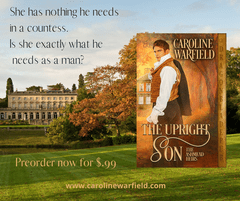
“Stop it, Percy! You’re roiling up the water and chasing away the frogs,” Alf said.
Delia reached for Percy. She managed to grab one arm when Penny piped up. “There are riders coming, Mama.”
Delia glanced back over her shoulder to see a man and a boy approach. She and the children rented the Clarion dower house. In the four months since they took up residence, she had never seen the earl, having been told he preferred London, particularly when Parliament was in session. The rider’s haughty expression, distinguished bearing, and thick auburn hair left her in little doubt that she saw him now.
Caught at her least dignified, embarrassment distracted her. She wasn’t prepared when Percival yanked on her arm and overturned her balance. Flail her arms though she did, she could do nothing to prevent her tumble into the water.
“Hogswallop!” she grumbled and immediately prayed the earl didn’t hear her. She rose, striving for as much grace as she could muster, with weeds clinging to her sodden gown and a squirming toddler pulling on her arm.
Man and boy pulled to a stop. “Good afternoon,” she chirped before they could speak.
Clarion—for it must be he—blinked. The boy looked up at his father as if to ask how to behave.
“I don’t believe I know you,” the earl said, staring at her muddy hems.
“Do you know everyone?” she asked intrigued. She stepped up onto the bank and pulled Percy with her.
“Everyone who would freely do whatever it is you’re doing on the Clarion estate.” He waved a hand as if to encompass the entire scene. “May I ask your identity and your purpose here?”
“Of course. We haven’t been properly introduced. I am Lady Delia Fitzwallace. We have the privilege of renting the Clarion dower house. We have a five-year lease.” She wasn’t sure why she added that last, except perhaps a fear this stern man might turn them out.
He appeared startled by her title, and Delia suspected he may have taken her for a tavern trollop of some sort, though the children might have given him a clue if he cared to consider it. As it was, she had failed to use her proper form of address as Lady Vincent Fitzwallace, stubbornly refusing to go by her late husband’s name.
He didn’t dismount. “I am Clarion,” he pronounced with a slight inclination of his head. “I am pleased to make your acquaintance.”
He didn’t look pleased. Delia gave a proper curtsy, somewhat hindered by the state of her gown.
Does one introduce children by name to an earl? She couldn’t remember and rather thought not. “Children, make your obeisance to the earl, if you please.” They did. Alf and Penny had fine manners under normal circumstances. They managed. Even Percy produced a damp and rather dramatic bow. He returned to staring gape mouthed at the horses.
Clarion cleared his throat. “This is my son, Viscount Ashmead.”
The unsmiling boy, his expression uncannily like his father’s, inclined his head with all the hauteur of a prince of the realm. He looked to be Alf’s age, and yet he had the mien of an old man.
The silence stretched until Delia broke it. “As to what we are about, we are hunting frogs’ eggs. We thought to observe the transition from egg to tadpole to frog.”
“It is a scientific endeavor,” Alf added.
That broke through the little viscount’s stern expression. He gazed at Alf with interest.
The earl’s silence unleashed an imp in Delia. She made her eyes wide with faux innocence. “Oh dear. I hope the harvesting of frogs’ eggs isn’t some sort of poaching. I would hate to run afoul of the law so soon in our tenancy.”
“Of course, it isn’t!” the earl snapped. “The Clarion estate can spare a few frogs. I— I’ll leave you to it.” He moved his reins as if to turn, but thought better of it and looked back at her. “Do you generally allow your children to run free across the estate?” he asked.
“Do they appear to be unsupervised?” she retorted. Given her appearance she wouldn’t have blamed him if he said yes, but she was prepared to defend her mothering if she needed to.
His bewildered expression rewarded her. “Of course not,” he said.
“They have been instructed to stay clear of the main house. Their greater temptations are your stables and vicinity, but they have accepted the need to respect that area as well. They know not to touch the property of others. They know better than to ramble through plowed fields or growing crops. They—”
“Enough! I take your point. Good day, madam.” With an inclination of his head, he and his son turned, and Delia’s children watched them ride away.
“He’s not a happy man,” Penny said.
Understatement, that. One of her father’s dictates gave Delia a twinge of regret. He always said, “You never have a second chance to make a good first impression.”
You’ll never live this one down, Delia, and more’s the pity. For all his stern reserve the earl was an attractive man, and one who appeared to care for his son. She admired that in a man.
With a sigh she locked this regret away with the others she’d endured. She refused to let life’s disappointments weigh her down.
“Alf, there! I see an egg mass,” Penny crowed behind her. And so she had. Delia turned to share her children’s delight.
She put her stern landlord out of her thoughts.
June 25, 2022
Spotlight on Lady No More

She ’ s through with love.
Lady Laurel Devereaux prided herself on her sterling reputation, even as she overlooked her two younger sisters’ foibles and their ailing grandfather’s little peccadilloes. She always adored frolicking in fountains and dancing before breakfast. But those were innocent delights compared to the one night she left a ballroom to play the piano alone—and a charming man joined her to play a duet that became a mad love affair.
He quickly proposed and just as quickly jilted her. Now she’ll marry only for friendship or security or children.
He ’ ll never give her up again.
Now Hadley, Viscount Grey, arrives in Brighton and vows to win Laurel back. But this time, his greatest problem is not overcoming his competition or challenging Laurel’s vow to remain a proper lady, but her decision to never love another man.
How can he convince her that she simply never stopped loving him?
Link: https://amzn.to/3x9SZlX
Series link: https://amzn.to/3HfcXzs
Amazon: https://www.amazon.com/dp/B0B3BRL61Y
ACIS: B087R6KCVH
ExcerptOf all the people in all the world, the one who should never have walked into her cousin Cass’s grand salon was Hadley Sherborne, the dastardly, the false, the dishonorable Viscount Grey. Two years ago, the scoundrel had broken her heart—and their engagement—and she had no reason to welcome him here. Or anywhere within a thousand miles of her. Ever again.
Yet she squared her resolve to appear civil. Minutes ago, he’d strode in with three other men, all of whom had rescued her sister Addy from abduction. And ruin.
Ironic, that Hadley had destroyed Laurel but saved her sister.
Thus, here he stood, docile as a lamb.
A wolf in lamb’s clothing.
Laurel took a glass of bubbly from the footman’s tray and downed a good swallow. She’d hugged her sister, welcomed her back to safety and security. She was happy for her. Addy didn’t deserve to be so horribly used as to have been abducted and by a man of the cloth, too. What nerve that creature had to so misuse a young woman. What hideous arrogance to think one could kidnap a lady to compel her to marry.
Laurel nodded at that. Marriage should be undertaken for respect and affection, at the least. For love, at the best. She took another hefty swig of her good white wine and considered what it would have meant to her had Hadley ever abducted her. She’d be his wife. His bed partner. His lover. As once she’d been…
And lived to regret it.
Across the rosy gold salon, Hadley stood talking with Cousin Cass and that lady’s dashing beau, Colonel Lord Magnus Welles. Carefree, forthright in his regard to Cass and his friends, he’d greeted her politely and briefly. He’d shown no twitch of his mouth or blink of his eye that he recalled any of the humor or passion of their past.
She wished she knew how she had acted as they met just now. Shock could transform a woman. Of that she’d had first hand experience the day Hadley had appeared in her Grandpapa’s drawing room and told her he was breaking their engagement. His announcement had turned her into a mole, a shrew…a tiny animal who was less herself. Still, she had put a good face on her sorrow, if she said so herself, even after Grandpapa had died. Months later, Cousin Cass had come to Ireland. She’d mourned with them and educated them in the ways of proper British society. Then Cass had scooped up her two sisters and her and spirited them off to London, Brighton and the charms of a debutante Season. There their mother’s relative offered the triplets a plunge into the haute ton and the hope of a respectable marriage loomed before each of them.
In less than three weeks in town, both her younger sisters had found men they loved. Imogen had married the Earl of Martindale last week. Tomorrow, Adelaide would marry the Marquess of Heath, a fine fellow who had rescued her sister from the clutches of a perverse young man. Addy’s intended had been assisted by three gentlemen. Cass’s new beau, a colonel of the Royal Buffs and a decorated soldier. A cavalry man, Captain Fitzroy, recently home from the wars on the Continent. And Hadley. Here in Brighton. When he should be home in Wiltshire after a wedding in June to a young lady who had land, money and Hadley’s father’s blessing.
Instead you are here. Alone. Why, Hadley?
Grey. She must call him ‘Grey’. ‘My lord.’ ‘Scoundrel.’
The man cut a fine figure, too. Damn his hide. In a midnight blue cutaway frock coat, black Hessians and tight fawn breeches dusty from the group’s hurried ride across Brighton to Hove to the home and stables of the Earl of Davenport, Hadley…Grey looked like a devil’s advocate. His hair—the color of sunshine—glowed with streaks of old gold. Tousled by wind and exertion, locks of his hair hung over his brow in boyish abandon. His sharp cheekbones were stained pink from the rough ride in the hot August sun. His mouth was full and ripe, able to entice and claim and sip from a girl the noblest of intentions. Oh, yes, Hadley Sherborne, Viscount Grey, who had tasted her with those lips and promised with those lips, had also lied with those lips.
“I love you, my darling, and I’ll never part from you.”
But he had parted from her.
Soon, too.
Three weeks later, in fact.
Those lips that had kissed her, those hands that had caressed her, that rogue who had seduced her had abandoned her. Told her his father had demanded he wed the family friend’s daughter who lived across the river. He’d also told her he would go home to England, correct the error his father had made, apologize to his old friend whom her father and his had betrothed to him, then he would return to Laurel.
But she was Lady Laurel Devereaux, then age eighteen and with her two sisters the only remaining offspring of infamous Irish aristocrats. She’d grown up immersed in tall tales told by the likes of her Anglo-Norman family who were real live faeries. Those clever charmers possessed boundless imagination and very few scruples. They had woven their sprightly fables for more than eight centuries to mine their reputation, earn their keep and multiply their fortunes. They had also covered their losses and camouflaged their crimes.
Truly, she should have known a fairy tale when she heard it. Believing Viscount Grey’s declaration of love was her failure. She’d not be so naive about any man ever again. She was here in Brighton to marry for security. For money. For children. Perhaps, if she were lucky, she’d also laugh again. Indeed, she’d marry for many reasons. None included love.
She drained the last of her wine.
“Dinner!” Cousin Cass announced with glee for all assembled in the salon. “We will celebrate the coming nuptials of our dear Adelaide and the Marquess of Heath.”
Only fitting. Laurel considered reaching for more wine from the footman’s tray, but Adelaide gave her a mischievous little troll’s eye. Very well. Laurel demurred. She had been drinking more than she should lately. Things had not been calm here in the marriage mart. She’d worried about the unscrupulous men she and her sisters had met. First Imogen had been assaulted by one evil sort who had tried to sully her in Dublin years ago, then tried again here. But she was rescued by the noble man who married her. Today dear Addy had been abducted and saved from ruin by her own Sir Galahad, the Marquess of Heath. Amid all that, their older cousin, Cass, Lady William Downs, had been cuddling in closets and map rooms with the strapping Colonel Welles there. Who had Laurel been entertaining? No one worth his salt. Of course, she’d have a few nips. Who wouldn’t!
But, Addy was right. Drinking was not good for the old reputation. Not very good for her attempt to establish a new one either.
She’d accept what she could not change.
Tonight at this intimate party, she’d celebrate the good turn of events. Even if they were in no small part thanks to the the man who had once been her dearest love, her fiancé. Grey had been heroic. He’d saved her sister. After that, for Laurel to be ungracious to him would be so de trop.
Fie! The things she did for love.
June 23, 2022
The Development of Democracy: commerce, power, and oppression
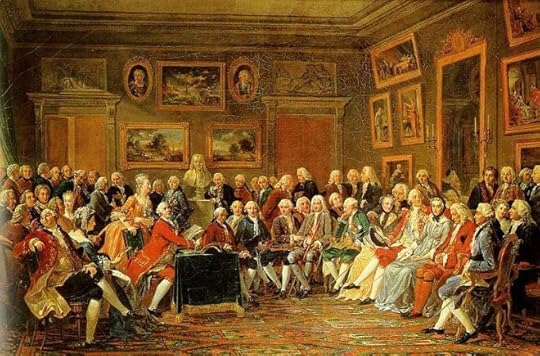
At the beginning of the eighteenth century, the term democracy referred to a primitive and failed form of government used in ancient cultures. Popular government, their worldview held, would lead to conflict and turmoil. Every person would desire to be master over others and no one would want to obey.
Modern countries, so the argument went, needed to have an ordered system whereby some ruled and others obeyed, so that they could engage in foreign trade and defend their independence. Democracy was only fit for small communities hiding out in harsh places where they needed to be frugal, disciplined and hard-working to survive. But what worked for a city republic would not work for a country. Self-interest, love of money, and inequality was what allowed modern eighteenth century states to survive and prosper. But unbridled self-interest led to excess, which needed a monarch to contain it.
These philosophers didn’t want to give power to the multitude, but to correct their vices, instead. In this way, commerce could reign supreme, bringing wealth to those nations who succeeded in the marketplace.
One of the great debates of the century was whether commerce would channel aggression, or become another reason for aggression. Some argued that people would reject war in order to trade. Others that competition over trade would lead to war.
Even so, a number of influential thinkers were committed to the idea of a republic. They proposed that people could only be free if they were actively committed to and participated in public affairs. A monarch, even one that did not abuse his or her power, make the people unfree by definition. However, a republic would not work unless everyone was committed to the wellbeing of the community. Self-government required moral behaviour.
English and European philosophy are midwives to a new republicThe thinking of these philosophers influenced the American founding fathers.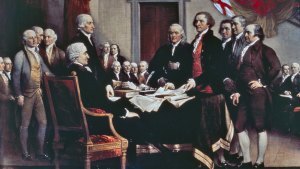
The right to representation, political independence, separation of church and state, nationalism, slavery, the closure of the Western frontier, increased taxation, commercial restrictions, use of the military in civil unrest, individual freedoms, and judicial review were some of the salient issues that boiled up in the revolutionary cauldron of Britain’s American colonies. [https://www.loc.gov/exhibits/creating...]
They argued, it is true, about whether what they were creating was a democracy. It all depended on how you defined democracy. But there’s no doubt that the Declaration of Independence had many democratic features. It called for no taxation without representation. It denounced unearned titles. It demanded that all institutions were subjected the test of reason. And the final version of the Constitution isclearly envisaged what most of us would call a democracy.
The French seek liberty, equality, and fraternity
“The Revolution was in the minds of the people, and this was effected, from 1760 to 1775, in the course of fifteen years before a drop of blood was drawn at Lexington.”
John Adams to Thomas Jefferson, August 24, 1815
 In the eighteenth century, France was rapidly changing from a fundamentally agricultural society to a commercial empire with many overseas outposts. The population was increasing, and industrial production was rising. And the French Enlightenment was focused on transforming cultural, scientific and political thinking. Thinkers such as Helveetius, Dietrich, d’Holback, de Condillac, de la Metrie, and Rousseau explored different fields, but agreed that tradition was a bad guide to the future, that government and justice needed radical improvement, and that free-market economics was the way of the future.
In the eighteenth century, France was rapidly changing from a fundamentally agricultural society to a commercial empire with many overseas outposts. The population was increasing, and industrial production was rising. And the French Enlightenment was focused on transforming cultural, scientific and political thinking. Thinkers such as Helveetius, Dietrich, d’Holback, de Condillac, de la Metrie, and Rousseau explored different fields, but agreed that tradition was a bad guide to the future, that government and justice needed radical improvement, and that free-market economics was the way of the future.
Montesquieu, who admired the way in which the English king shared power with Parliament, wrote The Spirit of the Laws, a survey of political insititutions throughout the world. Rousseau’s seminal work was The Social Contract, speaks of empowerment through united with other public minded citizens. He argued that men are by nature free, and so should all have equal rights and should be able to participate in deciding the laws under which they live.
Scholars argue about whether the monarchs of the ancien regime chould have reformed enough to prevent the revolution. They agree, though, that tens of thousands of people formed by the writings of the Enlightenment weren’t prepared to tolerate being disempowered any longer. War, taxes, the widening gap between rich and poor, the intransigence of the various French Parlements, all contributed. In the end, the revolution came and swept away the ancien regime.
For a brief few years, before its own excesses, political infighting and outside threats made an Emperor look enhancing, France was a representative democracy. Perhaps only a third of all eligible men voted in the first election, but that was still more than any other country in the world at the time. Even after the monarchy was restored, the fight for liberty, equality and fraternity continued to fire the hearts of the French people, as it still does today.
Paine reintroduces democracy as a positive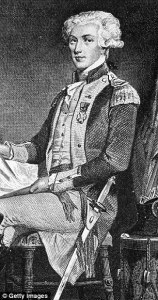 Thomas Paine was first man in modern times to present democracy as a positive term. To do so, he redefined democracy. He suggested that, while direct democracy (where everyone voted on everything) was inconvenient, representative democracy (where everyone voted on the people who would decide everything) avoided the problems of both direct democracy and oligarchy or autocracy. His writing caught the attention of American intellectuals, and the modern view of democracy was born.
Thomas Paine was first man in modern times to present democracy as a positive term. To do so, he redefined democracy. He suggested that, while direct democracy (where everyone voted on everything) was inconvenient, representative democracy (where everyone voted on the people who would decide everything) avoided the problems of both direct democracy and oligarchy or autocracy. His writing caught the attention of American intellectuals, and the modern view of democracy was born.
Sources:
https://www.researchgate.net/publicat...
http://www.let.rug.nl/usa/essays/befo...
https://www.cambridge.org/core/books/...
June 21, 2022
Friends on WIP Wednesday
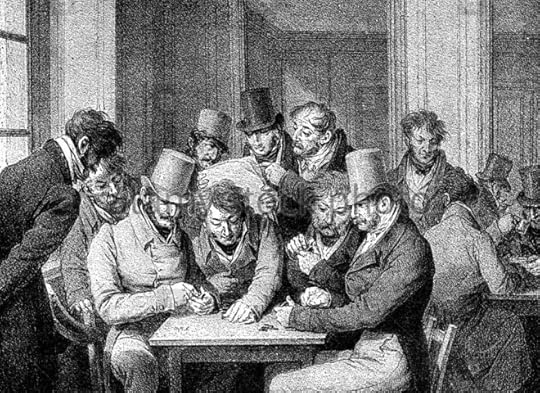
Coffee houses were popular meeting places
Friends are useful to a novelist–someone for a character to talk to about everything that’s bothering him or her. Or, if they’re not the talking sort, someone to prompt thoughts of what they’d like to talk about. In my current work in progress, Snowy and the Seven Blossoms, my hero has two close friends, both of them members of a group of investors that he founded.
Here they are, discussing railways. And then more.
The discussion continued even after the meeting was over and the other investors had left, the decision still on the table.
“Locomotives are unreliable,” Gary declared. Gaheris Fullerton was the first real friend Snowy had ever had, another scholarship student and one of the smartest men Snowy knew. The second son of a poor working family in the Midlands, he’d read law at Oxford and had overcome the disadvantages of his origins to complete his four years at an Inn of Court and be accepted to the Bar.
“If Murray and his ilk can overcome the difficulties with the steam locomotive, the canals are not going to be able to compete,” Drew countered. The fourth son of a duke, Lord Andrew Winderfield had been brought into the group by another investor because of his family owned a prosperous shipping company, but he’d soon become another friend. He was one of the few aristocrats Snowy trusted.
Gary scoffed. “A big if. Those machines are dangerous and unreliable. And too heavy. I’ve heard about the problem they’re having with the rails.”
Drew was adamant. “They’ll find solutions. And when they do, rail paths will be cheaper to build and much much faster than the canals. We should reject any canal project that will take more than ten years to recover costs.”
Gary was not convinced. “You think the collieries and others will prefer wagon rails to canals in less than ten years?”
“Some of the collieries do now,” Drew retorted. “Wales and Scotland are making great strides. My brother predicts that we’ll have them hauling passengers within a decade.”
Gary shook his head. “And who will want to ride in a carriage pulled by a locomotive? Not me, that is for certain.”
“What do you think, Snow?” Drew asked.
Snowy had been thinking about his own problem while the friends argued. “I’ll consider it between now and the next meeting,” he said.
His friends exchanged glances. “I don’t think he asked us to stay on after the meeting to debate the merits of locomotives,” Drew surmised.
“Out with it then,” Gary commanded. “The witness at the bar will present his testimony.”
Where to start? “I have learned something… unsettling.” Which was a hell of an understatement. Snowy’s world had been rocked on its axis. He focused on Drew. “You know a bit about where I came from, and what the Blossoms mean to me.”
Drew nodded. “Your foster mothers,” he said.
It was as good a description as any. “They gave me a present for my birthday. The true story of my origins. If it is true. The thing is, they would never lie to me, so they believe it. But it is just too fantastic.” He batted one hand at the air, as if he could knock away his own confusion.
“Go on,” Drew said, when he remained silent.
“No,” Gary protested. “Elucidate. If you are not Moses White, brothel bookkeeper and investor extraordinaire, who are you?”
Snowy’s huff of amusement was genuine. “I am, of course. But apparently, I started out as Henry Snowden, elder son of Edward Snowden, who was the third son of Richard, Viscount Snowden.”
His friend looked startled, though not as flabbergasted as Snowy himself.
“Lily and her sister Iris found me in an alley when I was six years old. I’d been stripped and beaten. They figured out who I was, and tried to return me, but my mother asked them to keep me, and to keep me hidden.”
Gary lifted his eyebrows. “Mrs Snowden suspected someone of trying to do away with you?”
June 19, 2022
Tea with a prospective mistress

In this excerpt post from A Baron for Becky, Her Grace is looking out for her son. Poor Becky.
The Duchess of Haverford had been visiting friends in Cirencester and was on her way to call on a goddaughter in Bath. “You will remember Polly, Anne, dear. She married the Viscount Sudding. And she has been delivered of a son, which is such a relief for the family. Three daughters, you know, and the cousin a very odd man. One would not want him to inherit. And she is still young, so there may be more.”
The thought clearly reminded her of her own offspring. “Rede, I had such a comfortable coze with Aldridge today.” Aldridge was seated on the floor at her feet, and she patted his cheek lovingly. “I had no idea you were here, darling. So pleased. I thought you and your friend, Lord Overton, had gone off to a party somewhere.”
“Overton returned home, Mama,” Aldridge told her. They had separated in London two months ago, after Overton read Aldridge a lecture on his drinking, refusing to ‘follow him to perdition.’ Overton headed back north to his estate, his wife, and his stepdaughters, and Aldridge rambled from house party to house party. “His wife is in expectation of a happy event.”
“How lovely! Lord Overton was at school with Aldridge, my dears. You remember, Rede. Such a nice boy. Injured in the war, you know, then came home to inherit the barony.”
She patted her son’s cheek again. “He has settled down nicely since he wed. Aldridge quite misses him, do you not, my love?”
“He is staid and boring.”
“And a new baby,” the Duchess continued, taking no notice. “How lovely.”
Aldridge shifted from under his mother’s hand, and got to his feet. “Perhaps Mrs Darling would play for us. Would you be so kind?”
Rose nodded, taking the message from the abrupt change of subject. His Lordship’s friend was not a topic to be discussed in front of a mistress, however expensive.
Her Grace watched her son thoughtfully as he arranged music for Rose, then turned pages for her. “You play beautifully, my dear,” she said, when Rose returned to her seat.
“Simple things, Your Grace,” Rose said. “I fear anything difficult is beyond me.”
“You do well, my dear, to know your limits and stay within them,” the duchess replied, her grave look giving the words another layer of meaning.
By the time dinner was called, Rose knew where Aldridge came by his conversational dexterity. The duchess swooped, with butterfly ease, from family to family, throughout the ton, and up and down society. Her Grace, it seemed, knew everybody in England, was related to half of them, and was godmother to the other half.
The addition of a duchess to the table did not change the informality with which they dined, and the conversation ranged freely around the table. Her Grace had news of Lady Chirbury’s sister, Kitty, who had been staying with her in London. “Dear Kitty; she is meant to be refreshing her winter wardrobe, but she and Mia will be spending their pin money on music and books, I dare say.” And she had spent half an hour with the nursery party. “Your Sarah is such a pretty child, Mrs Darling. And lovely manners.”
After dinner, the ladies withdrew to the great parlour, leaving the two men to the port.
“I am travelling in the morning, so will go up to bed,” the duchess announced. “Mrs Darling, perhaps you would give me a few moments of your time?”
“Be nice, aunt,” warned Lady Chirbury, making Rose even more nervous. The duchess gave an enigmatic smile and led the way upstairs.
“Leave us, dear,” she said to the maid who was standing ready by the bed. “I shall ring when I want you.” She took a chair by the fire and waved Rose to the other.
“Do not look so nervous, Mrs Darling. I do not intend to bite you.”
Rose blushed scarlet. Aldridge had promised to bite her, and had explained exactly where. No. She must not think of that. She sat, as commanded.
“Mrs Darling, you were raised gentry, were you not?”
Rose nodded, cautiously. Where was the duchess going with this?
“The manners, the speech, the accomplishments—they can all be taught, of course. But one who has learned them from the cradle…” Her Grace waved a hand as if to flick away counterfeits.
“The usual story, I imagine? Seduction or rape? And no father to defend your honour?”
“My father…” Rose swallowed hard to remove the lump that closed her throat at the memories. “My father was a librarian. He took the part of his employer.”
“Ah.” Her Grace nodded. “And the employer was the cause of your downfall. Or his son, perhaps?”
“His son,” Rose confirmed. His sons, in fact, but she would not say that.
“And Sarah was the…?”
“No, Your Grace. Sarah… came later.”
“Mr. Darling?”
“There was no Mr. Darling,” Rose admitted.
The maid must have added a fresh log to the fire just before they arrived. The top was still uncharred, but flames licked up from the bed of hot embers. A twig that jutted from one side suddenly flared, turned black, and shrivelled. The bottom of the log began to glow red.
The duchess spoke again, startling Rose out of her flame-induced trance.
“What do you want for your daughter, Mrs Darling?”
“A better life,” Rose said immediately, suddenly fierce. “A chance to be respectable. A life that does not depend on the whims of a man.”
“The first two may be achievable,” the duchess said, dryly. “The third is highly unlikely for any woman of any station. You expect my son to help you to these goals, I take it.”
Rose was suddenly tired of polite circling. “I was saving so that I could leave this life, start again in another place under another name. But my last protector cheated me and stole from me.
“I do what I must, Your Grace. Should I have killed myself when I was disgraced? I had no skills anyone wanted to buy. I could play the piano, a little; sew, but others were faster and better; paint, but indifferently; parse a Latin sentence, but of what use was that in my circumstances? Should I have starved in the gutter where they threw me?
“Well, I was not given that choice. Those who took me from the gutter knew precisely what I had that others would pay for. As soon as I could, I began selling it for myself, and I. Will. Not. Be. Ashamed.”
Her vehemence did not ruffle the duchess’s calm. “We all do what we must, my dear. I am not judging you. Men have the power in this world, and women of the gentry are raised to depend on them for our survival. But you must know that Aldridge cannot offer marriage to a woman with your history.”
The mere thought startled a laugh out of Rose. Marriage had never crossed Aldridge’s mind. Of that she was certain. “His Lordship has offered me a two-year contract as his mistress,” she said, “with very favourable terms. If I accept, and if I save carefully, I will never need to take a protector again.”
“Two years!” The duchess arched a delicate eyebrow. “Aldridge seldom keeps a mistress beyond six months. He must be utterly besotted.”
“He has no thought of marriage,” Rose found herself reassuring the duchess. “And neither do I. I like him, but do not love him, and I think only love could make marriage tolerable.”
It was only partly true. She could easily fall in love with Aldridge… was, perhaps, beginning to do so already. That way, she knew, led to heartache, for the duchess was right. Aldridge would never offer her marriage, or even permanence.
The duchess nodded, decisively. “You are wise. I think you will be good for him, Mrs Darling—which is a ridiculous name. May I call you ‘Rose’?” Her Grace’s smile was a wonderful thing, another feature her son had inherited.
“Would you…” Rose had never imagined having such a conversation, but there was something about this woman. Nothing shocked her, and she listened. “Would you call me Becky? It is my real name.”
“Becky, then. Becky, as long as you remember that you will never be accepted as a fit mate for the future Duke of Haverford—which is a great shame, for you seem to be a fine young woman, but we must live in the world as it is—you and I shall be friends, and I shall support you and little Sarah to find the new life you seek when Aldridge is finished with you. He needs someone like you. He is not happy, poor boy.”
That squashed the nascent hope that the duchess’s sponsorship might mean she could avoid accepting Aldridge’s protection. Still, it was a good offer. Becky accepted the duchess’s outstretched hands. “Thank you, Your Grace. I will do my best to make him happy.”
June 18, 2022
Spotlight on The Upright Son
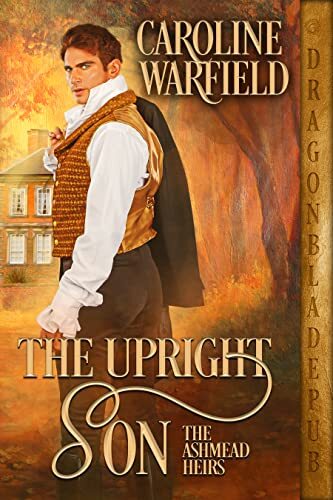
A notorious will left David, the very proper Earl of Clarion, with a crippled estate and dependents. He’s the one left to pick up the pieces while caring for others—his children, his tenants, and the people of Ashmead. He cares for England, too. Now that the estate has been put to right, he is free to pursue his political ambitions. But loneliness weighs him down. Then he meets his new neighbor.
Her uninhibited behavior shocks him. Why can’t he get her out of his mind?
Happily widowed Lady Delia Fitzwallace revels in her newly rented cottage, surrounded by flowers and the wonder of nature, thrilled to free her three rambunctious children from the city of Bristol and let them enjoy the countryside to the fullest. If only she can avoid offending her very proper neighbor, the earl, when their children keep pulling her into scrapes.
She has nothing he needs in a countess. Is she exactly what he needs as a man?
Read Free in Kindle Unlimited!
The Ashmead Heirs
The Wayward Son
The Defiant Daughter
The Forgotten Daughter
The Upright Son
June 14, 2022
Different worlds meet in WIP Wednesday
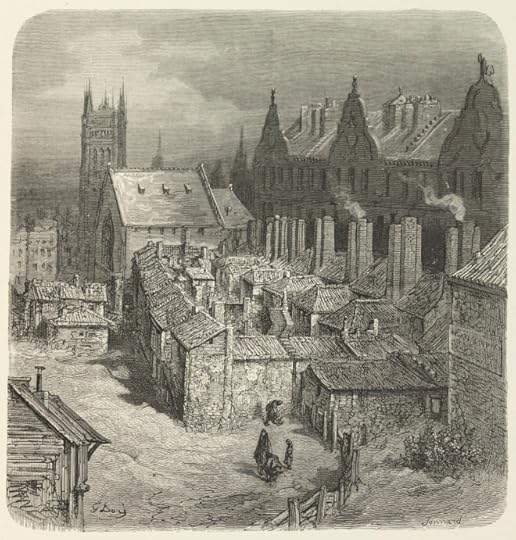
My latest hero resides in a slum. Here’s the first part of the first scene of his book.
Seven Dials, London, April, 1819
“That there countess is back again,” Tommy reported. Pestiferous woman. Snowy had told her repeatedly that she risked her reputation as well as her life by venturing into the slums to visit the residents of a brothel.
Stubborn female. Had she not already found out that her high birth and fancy title would not protect her if some of the slime who polluted the streets she traversed decided to kill her fancy footmen and help themselves to a taste of noble flesh?
Snowy’s anger rose again at the thought of how they had met. He would never forget his first sight of the lovely young woman standing over her footman’s body and swinging a weighted reticule to keep six armed men at bay.
Snowy sent the boy back to his post in the entrance hall. He left his account books and locked the door of the office. He would escort her home again, once she had finished whatever errand of mercy brought her back to the House of Blossoms.
He sighed. If he had not brought her here for refuge after he rescued her, she would never have met his friends, never have begun bringing them herbal remedies from her still room. How did a countess become a gifted herbalist? No. He did not want to know. His only interest was in seeing the woman returned to her own world.
Blue, whose nickname was an ironic comment on his flaming-red hair, guarded the top of the stairs on the floor with the private apartments. He stood as Snowy approached. “Where is she?” Snowy asked.
Blue pointed along the passage to Lily’s suite, which took some of the wind out of his sails. If Lily herself had invited the aristocrat to visit, then Snowy’s objections were on shaky ground. The owner and mistress of the House of Blossoms had her reasons for everything she did, and would not have brought the countess here on a whim.
At his knock, Lily called for him to enter. “Snowy,” she said. “I am pleased you are here. You know Lady Charmain, of course.”
Snowy gave the lady his best court bow. “My lady.” Not only did Lily expect him to display the impeccable manners she had paid his tutors to beat into him, but it discomposed the Countess Charmaine, which was turnabout and fair play, for she had been discomposing him since the day he looked into her vivid blue eyes.



